Local cooking experts share their stories.
By Rich Wicks | Guthrie Center Times
Some people have a knack for making wonderful meals. And, in rural America, these great cooks become local legends. Below are a few of these masters of the kitchen from the area.
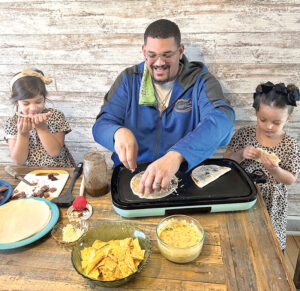
Bryce Olive cooking for his daughters, Nala and Baysil.

Bryce Olive cooking for his daughters, Nala and Baysil.
Bryce Olive
When someone excels at cooking, word gets around. And when it’s something like barbecue or smoked meats, the word spreads even more quickly. More and more people are learning that Bryce Olive of Guthrie Center really knows how to cook delicious meats.
Olive explained that his love of cooking happened gradually, and he’s self-taught.
Perfectly smoked and seasoned brisket by Bryce Olive of Guthrie Center.[/caption]“When I was in high school, my cousin and I used to make what we called ‘concoctions.’ We would watch YouTube and see these guys making insane meals, epic meals. We’d find things that we had in the refrigerator and kitchen, like tater tots, mushrooms, frozen pizza. It would be just a random collection of things, and we’d cook them and put them all together.”
From those early gut-churning beginnings, Olive eventually spent 10 years in Texas and said that’s when he fell in love with barbecuing. He recalled that he and several buddies would travel around to many of the larger cities in Texas, trying the varieties of barbecued meats.
“We would go in there and buy everything we could,” he said. “Briskets, pork, turkey — and we would rank them on tenderness, smoke ring, all that.”
The availability of quality barbecue changed abruptly when Olive came to Iowa.
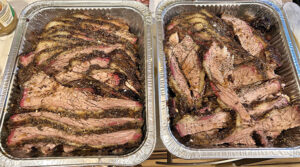
Perfectly smoked and seasoned brisket by Bryce Olive of Guthrie Center.
“When we moved here two years ago, I had already been practicing doing pulled pork and briskets and stuff like that,” he said. “And once we got here, I realized there is nothing around for barbecue.”
That spurred Olive to start spending more time making the type of barbecued meats that he prefers while perfecting his craft.
Olive said his barbecue style is a blend from his years in Texas and Florida.
“Florida is spicier and tangier, and Texas is cooked low and slow,” he said.
Olive said he hasn’t entered any cooking contests, but that his favorite meat to cook (and eat) is brisket.
“I have my own rub,” he said. “I’ve created my own seasoning for it. I try to stay away from store-bought stuff, because you can’t always depend on that one brand. And we have one side dish that we really love, called ‘street corn.’ ”
When not cooking, Olive and his wife, Katelyn, work as teachers. He teaches eighth grade history at Hiatt Middle School in Des Moines and also leads a weekly youth group (“The Swamp”) for seventh-12th graders at a local church. Katelyn teaches at Panorama. They have two daughters, Nala, 4, and Baysil, 5.
“The cooking is a family thing,” he said. “Katelyn makes a lot of sides and desserts. We bought the girls some play cooking sets. I definitely want to get them involved.”
One of Olive’s favorite cooking stories involved problems with the smoker.
“I thought everything was going wrong, but it turned out great,” he said. “That night, I had put the meat on in the smoker, and I had everything going fine. I waited a couple hours, came in and checked on it, and everything was fine. So I went to bed, and I came back in later to check on it, and the fire had gone out at some point overnight. So, I panicked and had to get it going again. Luckily, the meat had already gotten to about 160 degrees, so it was pretty much fully cooked.”
After getting things going again, he noticed a lot of smoke coming out of the smoker, much more than should be. Although he was hesitant to open the smoker and let all the heat out, he had to find out what was going on. It turned out that there was a small fire inside the smoker, so he had to extinguish that and get the meat cooking again. He was convinced the meat would turn out terribly but said, “After four hours, when I cut into it, it was probably the juiciest, most tender I’ve ever made. It turned out good.”
When asked if there are any items he wants to try cooking next, Olive said, “I think sausage is my next thing, coming up with a nice sausage and making it our own.”
That mirrors the advice he has for anyone thinking of trying to smoke their own meats.
“Do it. The first time I did it, I over-seasoned it, and it was so salty it was barely edible,” he said. “And the next time, I overcooked it, but it was nicely seasoned. So, it tasted good, but it was dry. You’ve just got to keep trying it and find a way to make it your own. Trust your gut.”
Paulette Albright
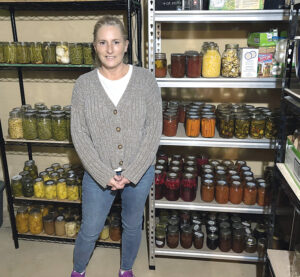
Paulette Albright has a pantry well-stocked with homegrown foods.
Paulette Albright of Guthrie Center is a “can do” person, and there are not many people who do as much canning as she does. She’s also an accomplished gardener, which directly feeds into her canning operation, since most of her canned goods are also home-grown.
Albright says gardening and canning was a family tradition when she was a child, and she’s glad to continue the tradition for her family now.
“I had 46 tomato plants this year, and eight or 10 rows of green beans,” she said. “Pretty much 90% of what we eat is fresh or canned.”
Another way Albright stretches her grocery budget and obtains fresh foods is called Bountiful Baskets.
“Bountiful Baskets is a group of people who choose to pool their money and purchase produce in large quantities from resellers at deep discounts,” she said. “This allows people to have more fresh produce for less money. In order to participate, you must set up a free account at bountifulbaskets.org.”
Albright stressed that Bountiful Baskets is not a business that people buy from but rather a group of people who pool money to buy things together.
“You contribute $21, and you get baskets of food,” she said. “You get a basket of fruit and a basket of vegetables. It’s basically enough food for two people for two full weeks. I started doing Bountiful Baskets in 2009 out of Des Moines.”
The baskets are distributed locally in Panora. Albright and other volunteers help to pack the items for participants to pick up on the distribution days.
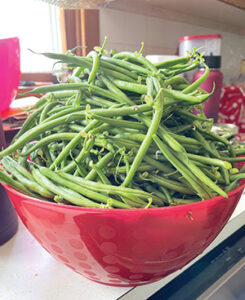
Paulette Albright’s homegrown green beans are waiting to be canned.
Bountiful Baskets distributes food every other Saturday, and since it is not a membership organization, people can participate on the weeks they wish and skip others. Albright said it’s been popular among daycare providers as a way to feed kids more affordably.
“Between the canning that I do here and then Bountiful Baskets, I very seldom have a need to go to the grocery store,” she said.
Regarding her home canning, Albright said she gives a lot away.
When showing the racks of canned foods in her pantry, she named off many of the items, saying, “I’ve got pickled green beans, pickled eggs, green beans, potatoes, dill pickles, pineapple, sweet pickles, peaches, applesauce, pears, peach salsa, 15 different kinds of jelly, cranberry juice, two different kinds of salsa, pickled jalapenos, pickled carrots, ketchup, barbecue sauce, corn, grape juice, jalapeno tomatoes, chili tomatoes, beef, ham and beans, chicken, spaghetti sauce, regular tomato juice, spicy tomato juice.”
She stressed that almost everything is grown in her garden. To can all of that food, Albright says she has somewhere between 800 to 900 home canning jars.
Albright said she got started as a kitchen wizard by attending 4H when she was 8 years old.
“I was too young, so I was a tag-along,” she said. “But we still had to participate in the fair, so I started helping with canning with my mom and grandma.”
Albright said she feels good knowing she’s providing real food for her family. Her advice to anyone interested in canning?
“Start small. It’s expensive to get started. Maybe help somebody and learn what you’re doing first before buying a bunch of stuff.”
Judi Zimmerline
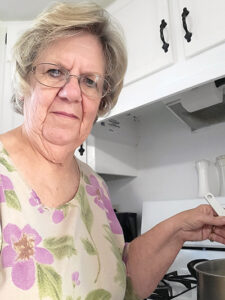
Judi Zimmerline stirs a pot of ingredients for her homemade treats.
Judi Zimmerline of Adair has a flair for candy making, and it ends up being a sweet deal for many local organizations as well. Zimmerline sells her creations and then donates 100% of the profits to worthy causes in the area.
“The last couple years, my biggest donations go to the Adair and Casey fire departments,” she said.
Zimmerline estimates that she started making a lot of candies about 15 years ago to help out the local Boys Clubs and Girls Clubs. Gradually, she started giving to other local organizations, including Odd Fellows, Rebekahs, Lions and churches. She has even given homemade treats to individual families that she knows are struggling.
Although Zimmerline makes her tasty creations year-round, she admits that the winter months are her busiest because of the holidays. When asked about her most popular candy items, she said, “Peanut butter balls are probably No. 1. I make a coconut ball, too, that’s really good. And toffee and caramels. People love homemade caramels. And I make a variety of fudge, like chocolate and vanilla, and then I make one with cranberries and English walnuts. And dipped pretzels. And I sell a ton of peanut brittle.”
Describing how she learned her candy-making craft and found recipes, Zimmerline said, “I had a beauty shop for 50 years, and I got lots of wonderful cooking advice from my customers.” She added that she is willing to share any of her recipes.

A cornucopia of candies are the handiwork of Judi Zimmerline.
Zimmerline is basically a one-person factory, although she said her husband helps some, especially with the dishes.
“And he helps roll the peanut butter balls,” she said.
A favorite story shared by Zimmerline was about a gentleman who asked if she makes peco, which is a type of peanut brittle that contains coconut. He said it was a family holiday tradition, but he couldn’t find anyone who makes it. Zimmerline took on the challenge.
“I made a batch, and I took it over on Christmas Eve, and his wife gave it to him on Christmas morning,” she said. “She sent me a picture of him on Christmas morning with his package of peco on his lap, and he said, ‘Now, it’s Christmas,’ because his mom had always made peco, and now they’re gone. It’s really fun to see how happy people are when they get their orders.”
